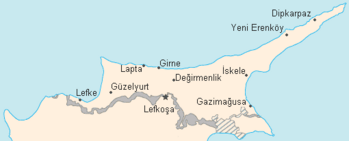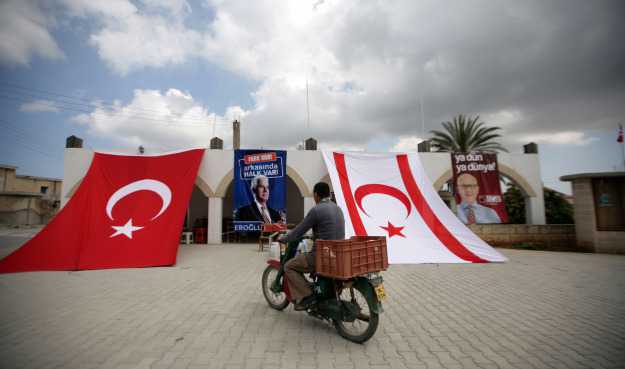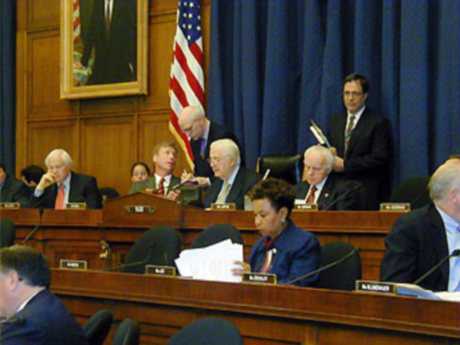Cyprus National Archives

Download


Cypriot President Dimitris Christofias gave Foreign Policy an interview earlier this week, where he offered an eloquent explanation of the factors that have conspired to leave his country his country divided [sic.], even after 36 years of diplomacy. But his answer to why the average U.S. citizen — or even the average diplomat in Foggy Bottom — should care about Cyprus’s plight was rather unsatisfying. “The United States of America is a bastion of freedom and human rights, isn’t it?” he said. “I call upon the Americans to respect the Cypriots as they respect themselves.”
That’s true, of course. Human rights are inalienable and universal, and if the approximately 1 million Cypriots are forced to live in a bifurcated nation, and the quarter million citizens of northern Cyprus exist in a state of international isolation, that’s an issue that deserves our concern. We should also be concerned with the treatment of the Uighur population in China, the work of Cambodia’s international tribunal, and the ongoing chaos in the Congo. In a world of finite resources, however, concern doesn’t necessarily translate into the United States spending time and money to resolve a problem.
However, there is a good reason that the United States should be paying active attention to the progress, or lack thereof, in resolving the Cyprus dispute. It just has less to do with the plight of Cypriots themselves, and more to do with the fate of Christofias’s primary rival: Turkey. The Turkish government, which is increasingly throwing its weight around in the Middle East, still refuses to recognize the Republic of Cyprus or let its vessels dock in Turkish ports. Cyprus, as a full member of the European Union, can be expected to continue to block Turkey’s EU accession bid until a resolution is reached. The fear is that, if Prime Minister Erdogan’s government finds its path blocked to the West, it will increasingly drift into the orbit of Iran and Syria.
Indeed, the lack of progress on the Cyprus issue is just one instance of how Erdogan’s ambitious foreign policy has been unable to resolve issues closer to its borders. While Erdogan travels the globe blasting Israel for its policy toward Gaza or mediating the dispute over Iran’s nuclear program, his diplomats have also made little progress in normalizing relations with Armenia; efforts to resolve the increasingly violent conflict with Turkey’s Kurdish population have also stalled. Issues like Cyprus, Armenia, and Kurdish integration might not command the international spotlight in the same way as Iran and Israel can, but they are arguably more important for Turkey’s long-term well being.
,October 1, 2010

Bill Text Versions
111th Congress (2009-2010)
H.RES.1631
There are 2 versions of Bill Number H.RES.1631 for the 111th Congress.
Usually, the last item is the most recent.
1 . Calling for the protection of religious sites and artifacts from
and in Turkish-occupied areas of northern Cyprus as well as for
general respect for religious freedom. (Introduced in House –
IH)[H.RES.1631.IH][PDF]
2 . Whereas the Government of Turkey invaded the northern area of the
Republic of Cyprus on July 20, 1974, and the Turkish military
continues to illegally occupy the territory to this day; (Engrossed in
House [Passed House] – EH)[H.RES.1631.EH][PDF]
———————————————————————
H.RES.1631 — Whereas the Government of Turkey invaded the northern area of the Republic of Cyprus on July 20, 1974, and the Turkish military continues to illegally occupy the territory to this day; (Engrossed in House [Passed House] – EH)

HRES 1631 EH
H. Res. 1631
In the House of Representatives, U. S.,
September 28, 2010.
Whereas the Government of Turkey invaded the northern area of the Republic of Cyprus on July 20, 1974, and the Turkish military continues to illegally occupy the territory to this day;
Whereas the Church of Cyprus has filed an application against Turkey with the European Court of Human Rights for violations of freedom of religion and association as Greek Cypriots in the occupied areas are unable to worship freely due to the restricted access to religious sites and continued destruction of the property of the Church of Cyprus;
Whereas according to the United Nations-brokered Vienna III Agreement of August 2, 1975, `Greek-Cypriots in the north of the island are free to stay and they will be given every help to lead a normal life, including facilities for education and for the practice of their religion * * *’;
Whereas according to the Secretary General’s Report on the United Nations Operation in Cyprus in June 1996, the Greek Cypriots and Maronites living in the northern part of the island `were subjected to severe restrictions and limitations in many basic freedoms, which had the effect of ensuring that inexorably, with the passage of time, the communities would cease to exist.’;
Whereas the very future and existence of historic Greek Cypriot, Maronite, and Armenian communities are now in grave danger of extinction;
Whereas the Abbot of the Monastery of the Apostle Barnabas is routinely denied permission to hold services or reside in the monastery of the founder of the Church of Cyprus and the Bishop of Karpass has been refused permission to perform the Easter Service for the few enclaved people in his occupied diocese;
Whereas there are only two priests serving the religious needs of the enclaved in the Karpas peninsula, Armenians are not allowed access to any of their religious sites or income generating property, and Maronites are unable to celebrate the mass daily in many churches;
Whereas in the past Muslim Alevis were forced out of their place of prayer and until recently were denied the right to build a new place of worship;
Whereas under the Turkish occupation of northern Cyprus, religious sites have been systematically destroyed and a large number of religious and archaeological objects illegally looted, exported, and subsequently sold or traded in international art markets, including an estimated 16,000 icons, mosaics, and mural decorations stripped from most of the churches, and 60,000 archaeological items dating from the 6th to 20th centuries;
Whereas at a hearing held on July 21, 2009, entitled `Cyprus’
Religious Cultural Heritage in Peril’ by the U.S. Helsinki Commission, Michael Jansen provided testimony detailing first-hand accounts of Turkish soldiers throwing icons from looted churches onto burning pyres during the Turkish invasion and provided testimonies of how churches were left open to both looters and vandals with nothing done to secure the religious sites by the Turkish forces occupying northern Cyprus;
Whereas Dr. Charalampos G. Chotzakakoglou also provided testimony to the U.S. Helsinki Commission that around 500 churches, monasteries, cemeteries, and other religious sites have been desecrated, pillaged, looted, and destroyed, including one Jewish cemetery;
Whereas 80 Christian churches have been converted into mosques, 28 are being used by the Turkish army as stores and barracks, 6 have been turned into museums, and many others are used for other nonreligious purposes such as coffee shops, hotels, public baths, nightclubs, stables, cultural centers, theaters, barns, workshops, and one is even used as a mortuary;
Whereas expert reports indicate that since 2004 several churches have been leveled, such as St. Catherine Church in Gerani which was bulldozed in mid-2008, the northern wall of the Chapel of St.
Euphemianos in Lysi which was destroyed by looters as they removed all metal objects within the wall, the Church of the Holy Virgin in the site of Trachonas was used as a dancing school until the Turkish occupiers built a road that destroyed part of it in March 2010, the Church of the Templars was converted into a night club, and the Church of Panagia Trapeza in Acheritou village was used as a sheep stall before it was recently destroyed by looters removing metal objects from medieval graves within the church;
Whereas the Republic of Cyprus discovered iron-inscribed crosses stolen from Greek cemeteries in the north in trucks owned by a Turkish-Cypriot firm that intended to send them to India to be recycled;
Whereas United States art dealer Peggy Goldberg was found culpable for illegally marketing 6th century mosaics from the Panagia Kanakaria church because the judge found that a `thief obtains no title or right of possession of stolen items’ and therefore `a thief cannot pass any right of ownership * * * to subsequent purchasers.’;
Whereas the extent of the illicit trade of religious artifacts from the churches in the Turkish occupied areas of northern Cyprus by Turkish black market dealer Aydin Dikmen was exposed following a search of his property by the Bavarian central department of crime which confiscated Byzantine mosaics, frescoes, and icons valued at over =30 million;
Whereas a report prepared by the Law Library of Congress on the `Destruction of Cultural Property in the Northern Part of Cyprus and Violations of International Law’ for the U.S. Helsinki Commission details what obligations the Government of Turkey has as the occupying power in northern Cyprus for the destruction of religious and cultural property there under international law;
Whereas the Hague Convention of 1954 for the Protection of Cultural Property During Armed Conflict, of which Turkey is a party, states in article 4(3) that the occupying power undertakes to `Prohibit, prevent and, if necessary, put a stop to any form of theft, pillage or misappropriation of any acts of vandalism directed against cultural property’;
Whereas according to the 1970 United Nations Educational, Scientific and Cultural Organization (UNESCO) Convention on the Means of Prohibiting and Preventing the Illicit Import, Export and Transfer of Ownership which has been ratified by Cyprus and Turkey, parties are required to take steps to prevent illicit traffic through the adoption of legal and administrative measures and the adoption of an export certificate for any cultural object that is exported, and `illicit’
refers to any export or transfer of ownership of cultural property under compulsion that arises from the occupation of a country by a foreign power;
Whereas according to the European Court of Human Rights in its judgment in the case of Cyprus v. Turkey of May 10, 2001, Turkey was responsible for continuing human rights abuses under the European Convention on Human Rights throughout its 27-year military occupation of northern Cyprus, including restricting freedom of movement for Greek Cypriots and limiting access to their places of worship and participation in other aspects of religious life;
Whereas the European Court further ruled that Turkey’s responsibility covers the acts of soldiers and subordinate local administrators because the occupying Turkish forces have effective control of the northern part of the Republic of Cyprus;
Whereas in March 2008, President Christofias and former Turkish Cypriot leader Talat agreed to the setting up of a `Technical Committee on Cultural Heritage’ with a mandate to engage in `serious work’ to protect the varied cultural heritage of the entire island;
Whereas this Committee was developing a list of all cultural heritage sites on the island to create an educational interactive program for the island’s youth to understand the shared heritage and to undertake a joint effort to restore the Archangel Michael Church and the Arnvut Mosque;
Whereas while significant work was done on the Arnvut Mosque, the Archangel Michael Church remains in disrepair; and
Whereas, on July 16, 2002, and again in 2007, the United States and the Government of the Republic of Cyprus signed a Memorandum of Understanding to impose import restrictions on categories of Pre-Classical and Classical archaeological objects, as well as Byzantine period ecclesiastical and ritual ethnological materials, from Cyprus: Now, therefore, be it
Resolved, That the House of Representatives–
(1) expresses appreciation for the efforts of those countries that have restored religious property wrongly confiscated during the Turkish occupation of northern Cyprus;
(2) welcomes the efforts of many countries to address the complex and difficult question of the status of illegally confiscated religious art and artifacts, and urges those countries to continue to ensure that these items are restored to the Republic of Cyprus in a timely, just manner;
(3) welcomes the initiatives and commitment of the Republic of Cyprus to work to restore and maintain religious heritage sites;
(4) urges the Government of Turkey to–
(A) immediately implement the United Nations Security Council Resolutions relevant to Cyprus as well as the judgments of the European Court of Human Rights;
(B) work to retrieve and restore all lost artifacts and immediately halt destruction on religious sites, illegal archaeological excavations, and traffic in icons and antiquities; and
(C) allow for the proper preservation and reconstruction of destroyed or altered religious sites and immediately cease all restrictions on freedom of religion for the enclaved Cypriots;
(5) calls on the United States Commission on International Religious Freedom to investigate and make recommendations on violations of religious freedom in the areas of northern Cyprus under control of the Turkish military;
(6) calls on the President and the Secretary of State to include information in the annual International Religious Freedom and Human Rights reports on Cyprus that detail the violations of religious freedom and humanitarian law including the continuous destruction of property, lack of justice in restitution, and restrictions on access to holy sites and the ability of the enclaved to freely practice their faith;
(7) calls on the State Department Office of International Religious Freedom to address the concerns and actions called for in this resolution with the Government of Turkey, OSCE, the United Nations Special Rapporteur on Freedom of Religion or Belief, and other international bodies or foreign governments;
(8) urges OSCE to ensure that member states do not receive stolen Cypriot art and antiquities; and
(9) urges OSCE to press the Government of Turkey to abide by its international commitments by calling on it to work to retrieve and restore all lost artifacts, to immediately halt destruction on religious sites, illegal archaeological excavations, and traffic in icons and antiquities, to allow for the proper preservation and reconstruction of destroyed or altered religious sites, and to immediately cease all restrictions on freedom of religion for the enclaved Cypriots.